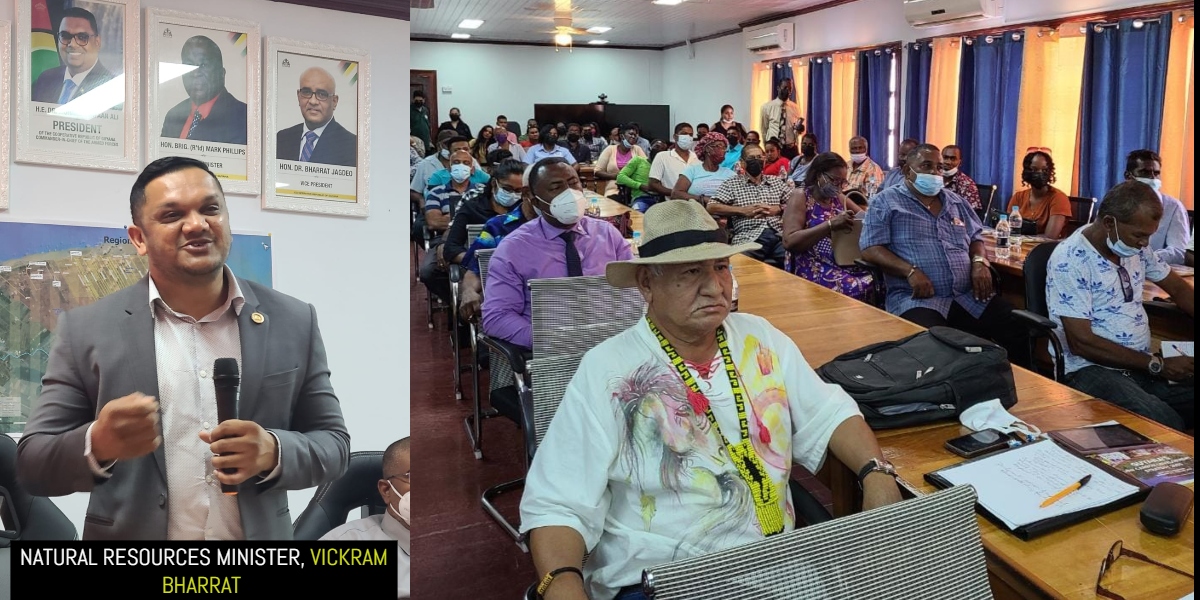“We are the real heroes,” is what Minister of Natural Resources, Vickram Bharrat declared on Wednesday as he addressed scores of Guyanese stakeholders gathered in the Boardroom of the Regional Democratic Council (RDC), New Amsterdam. Minister Bharrat was speaking to representatives from Region Six’s RDC, Neighbourhood Democratic Councils, logging associations and the New Amsterdam Municipality who participated in the consultative review of the draft Low Carbon Development Strategy (LCDS) 2030.
LCDS 2030 is the nation’s premier guide for transformational development. Bharrat said that Guyana has every right to pursue development and prosperity because she continues to pay the world her dues via the conservation of lush forest. The Minister described Guyana’s forest as a saving grace for the world noting that it captures excessive carbon dioxide that would otherwise contribute to the further destruction of the ozone layer.
Minister Bharrat recalled that when the LCDS 2030 was launched on October 28, last, President Dr. Irfaan Ali mandated that consultations be held throughout the country so that the citizens can fully understand the draft strategy; the benefits of the strategy and make recommendations for any possible strengthening.
Bharrat noted that the conversation on climate change and the reduction of carbon emissions have expanded significantly around the world. He said that this is especially as a result of the threat of natural disasters that are as a direct result of climate change. On that front, Bharrat referred to the devastating countrywide floods experienced in Guyana last year.
He noted that that was the first time that floods were experienced in hinterland jurisdictions known to be the highland regions. Bharrat acknowledged the economic strain and other burdens endured as a result of floods but noted that Guyana was not alone in distress.
The Minister told stakeholders that several parts of Europe also experienced floods last year and so did China and New York. “This is all as a result of global warming…the world is getting hotter because of the excess carbon emissions going into the atmosphere causing damage to the ozone layer. Twenty years ago, it was not as hot as it is today.”
Minister Bharrat noted that humans looked at development as more important than cutting emissions or keeping down the temperature of the globe and in many countries, forests have been replaced by factories and concrete jungles leaving little to no trees to capture carbon. He said that Guyana can however boast otherwise. “We are one of the few countries in the world that still has almost our entire forest standing.”
Bharrat said that the LCDS is all about protecting the forest and saving the world while prioritizing development and economic sustainability. Therefore, Guyana intends to conserve its forest; earn from said conservation and simultaneously exploit its natural resources in a responsible and sustainable manner. Therefore, logging will continue, mining will continue and so will oil production.
Touching briefly on the relationship between Guyana’s LCDS and its oil production agenda, Bharrat said, “We are blessed. We can produce oil and still be a significant net carbon sink because of the vastness of our forest and the carbon it stores and sequesters. We will continue to produce and continue to work with companies following best practices to reduce emissions.”
Bharrat stressed that as Guyana is already a carbon natural country as emissions are very far beneath what the forest sequesters or captures.
The Minister stated that emissions will further decrease over the years as Guyana weans itself off Heavy Fuel Oil and clings to cleaner energy sources. In this regard, Bharrat mentioned government’s gas to energy project and the Amaila Falls project both of which are being actively and seriously pursued.
Highlighting the gas to energy project, Bharrat said, “Once the gas to energy comes on stream in 2024, our emissions will be reduced. The gas to energy project will reduce our electricity bill by 50 percent and will give us reliable energy; meaning, we do not have to deal with all these power outages. Importantly, it will be cleaner energy and the emissions will be much lower than we are producing right now.”
The Natural Resources Minister also noted that the gas-to-shore project will come in handy against a growing demand for energy. “We are giving out all these house lots, which means more households; we are having all these hotels, all of these will require more energy and we will supply it.”
Essentially, Minister Bharrat told Berbice stakeholders that Guyana’s priority is all about reducing emission while securing development and economic wellbeing. He said they must go hand-in-hand.













